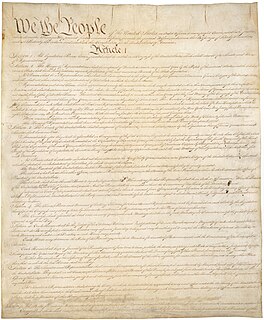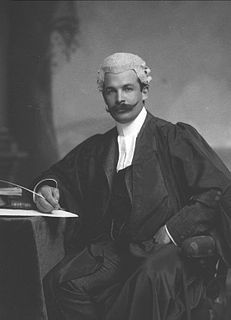| Discipline | Law |
|---|---|
| Language | English |
| Publication details | |
Publication history | 1919–present |
| Publisher | |
| Standard abbreviations | |
| A.L.R. | |
| Am. Law Rep. | |
In American law, the American Law Reports are a resource used by American lawyers to find a variety of sources relating to specific legal rules, doctrines, or principles. It has been published since 1919, originally by Lawyers Cooperative Publishing, and currently by West (a business unit of Thomson Reuters) and remains an important tool for legal research.

The law of the United States comprises many levels of codified and uncodified forms of law, the supreme of which is the United States Constitution, the foundation of the federal government of the United States. The Constitution sets out the boundaries of federal law, which consists of Acts of Congress, treaties ratified by the Senate, regulations promulgated by the executive branch, and case law originating from the federal judiciary. The United States Code is the official compilation and codification of general and permanent federal statutory law.

A lawyer or attorney is a person who practices law, as an advocate, attorney, attorney at law, barrister, barrister-at-law, bar-at-law, canonist, canon lawyer, civil law notary, counsel, counselor, counsellor, solicitor, legal executive, or public servant preparing, interpreting and applying law, but not as a paralegal or charter executive secretary. Working as a lawyer involves the practical application of abstract legal theories and knowledge to solve specific individualized problems, or to advance the interests of those who hire lawyers to perform legal services.

West is a business owned by Thomson Reuters that publishes legal, business, and regulatory information in print, and on electronic services such as Westlaw. Since the late 19th century, West has been one of the most prominent publishers of legal materials in the United States. Its headquarters is in Eagan, Minnesota; it also had an office in Rochester, New York, until it closed in 2019, and had an office in Cleveland, Ohio, until it closed in 2010. Organizationally, West is part of the global legal division of Thomson Reuters.
Each ALR volume contains several annotations. An annotation is an article that summarizes the evolution of a very specific legal concept in a concise and precise fashion. The article will either be preceded by the full text of an important relevant case, or in later series, contain a reference to the text of the case, which is reproduced at the end of the volume.
An annotation is a metadatum attached to location or other data.
A legal case is a dispute between opposing parties resolved by a court, or by some equivalent legal process. A legal case may be either civil or criminal law. In each legal case there is an accuser and one or more defendants.
The article will contain a wide variety of relevant citations to cases from throughout the United States and secondary sources like law review articles. The range and number of citations is always strongly representative but not always guaranteed to be completely comprehensive.
A law review is a scholarly journal focusing on legal issues. Law reviews are a type of legal periodical. In the US, law reviews are normally published by an organization of students at a law school or through a bar association. Outside North America, law reviews are usually edited by senior academics/faculty.
Although similar in tone to the articles in legal encyclopedias, ALR annotations are different in that they are not organized alphabetically, and they tend to delve more deeply into a specific legal principle or doctrine, while, in contrast, encyclopedia articles aim for a broader view of the legal issue. In addition, ALR articles are careful to provide cases on both sides of the legal issue and provide listings of cases according to their jurisdiction.
Since the annotations are published in the order the leading cases were decided, there are various finding aids. The combined ALR Index indexes topics covered from ALR2d to the current series of ALR and all series of ALR Fed. West's ALR Digest now follows the classification system of the West American Digest System, and includes headnotes for the reported cases, as well as references to the annotations. For topics covered entirely by federal law, the softbound Quick Index indexes annotations in ALR Fed. The softbound Table of Cases (for a state case) or ALR Federal Table of Cases (for a federal case) provides ALR references for a particular case. A reader may also use the references in American Jurisprudence, Corpus Juris Secundum, and state encyclopedias published by Thomson West to find a more in-depth discussion in ALR. Finally, ALR articles may also be searched on Westlaw. [1]
The West American Digest System is a system of identifying points of law from reported cases and organizing them by topic and key number. The system was developed by West Publishing to organize the entire body of American law. This extensive taxonomy makes the process of doing case law legal research less time consuming as it directs the researcher to cases that are similar to the legal issue under consideration.
American Jurisprudence is an encyclopedia of the United States law, published by West. It was originated by Lawyers Cooperative Publishing, which was subsequently acquired by the Thomson Corporation. The series is now in its second edition, launched in 1962. It is a staple of law libraries, and the current edition is over 140 volumes, updated with replacement volumes, annual pocket supplements, and a New Topic Service binder. The discussion has extensive research references to other Thomson West publications, including sister publications Am. Jur. Trials, Am. Jur. Proof of Facts, Am. Jur. Pleading and Practice Forms, and Am. Jur. Legal Forms. Before Thomson's acquisition of West Publishing, it was a competitor to Corpus Juris Secundum. Am. Jur. is available online through both Westlaw, and LexisNexis.
Corpus Juris Secundum (CJS) is an encyclopedia of United States law at the federal and state levels. It is arranged alphabetically, into over 430 topics, which in turn are arranged into subheadings. As of 2010, CJS consisted of 164 bound volumes, 5 index volumes and 11 table of cases volumes.
ALR has been published in several series (the current series is ALR7th) and there are series of ALR Fed (which focuses on federal law). ALR3d through ALR6th and ALR Fed are updated by pocket part supplements (the first series has a citation service, and ALR2d a Later Case Service). Annotations may be superseded by a later annotation in which the editor reanalyzes the law in light of recent developments.



